What is Messenger Marketing (and Related Benefits)?
What it is and how to leverage it properly. Let's find out!
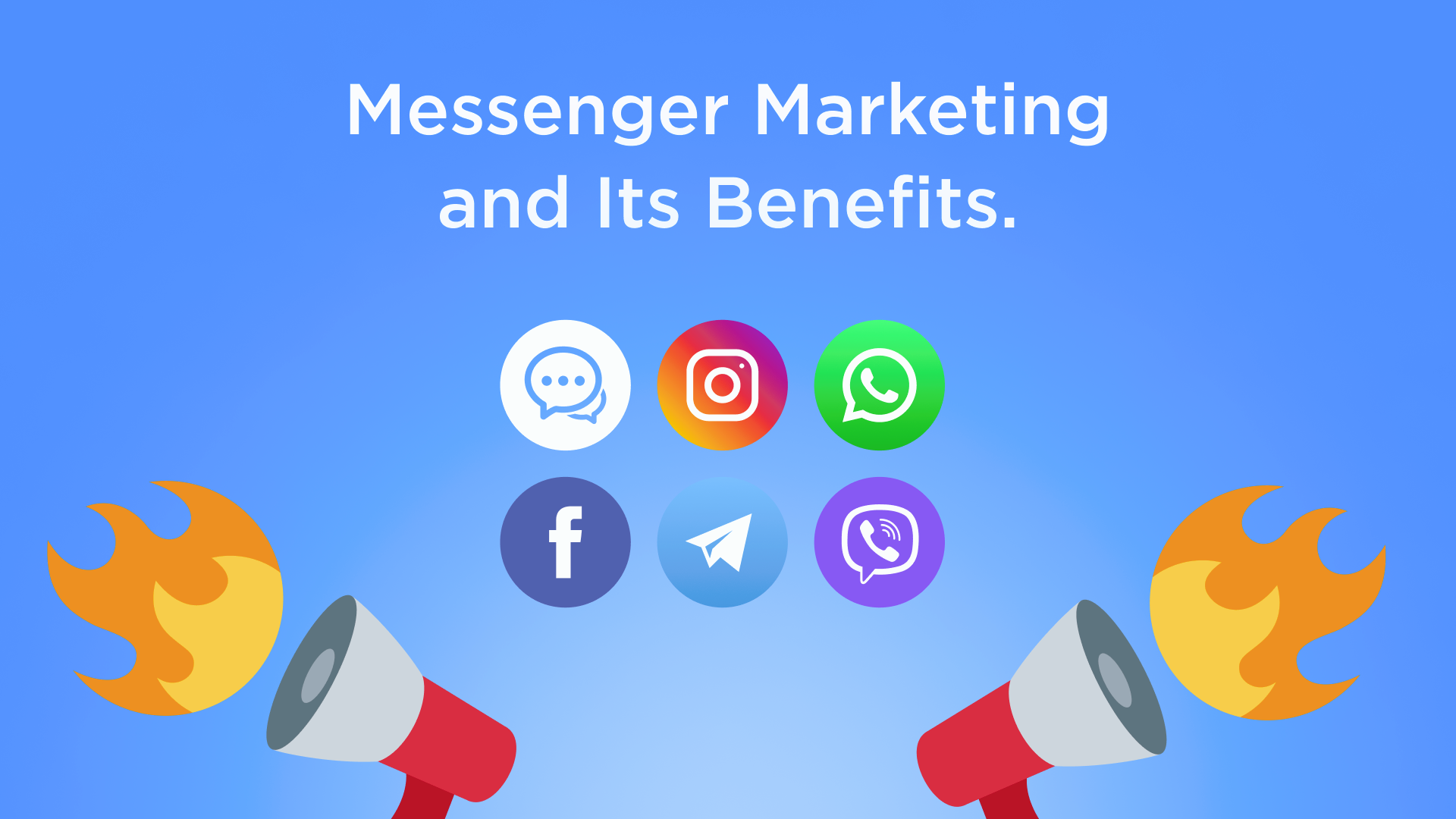
Over the last five years, instant messengers have become an essential part of the customer journey and, in turn, an important channel in both B2C and B2B industries. More than three billion people used messaging apps in 2021, boosting their popularity among all app types. Per a Juniper Research report, global mobile business messaging traffic hit 2.7 trillion in 2020. Thus, it’s evident modern society wants (and needs!) to send text messages. Companies therefore have no choice but to adopt messaging capabilities and reimagine their communication strategies by engaging clients where they are most comfortable.
Do you find yourself asking how you can establish strong relationships between a brand and a new generation of consumers, generate more qualified leads, drive more sales, and maintain higher retention rates? Messenger marketing may be just the thing you need.
Table of contents
What is messenger marketing?
Messenger marketing is a consistent and planned activity that utilizes messaging apps to interact with a target audience to reach marketing, sales, and support goals.
An added definition is the practice of engaging prospects and customers via dialogue-driven activities on Facebook Messenger, WhatsApp, WeChat, Telegram, or other messengers and social media channels popular among any given target market.
What is the goal of messenger marketing?
Messenger marketing aims to grow your business by attracting more clients through chats and other instant messenger communications. Business messengers, specifically, are designed to establish profitable, long-lasting relationships with current customers.
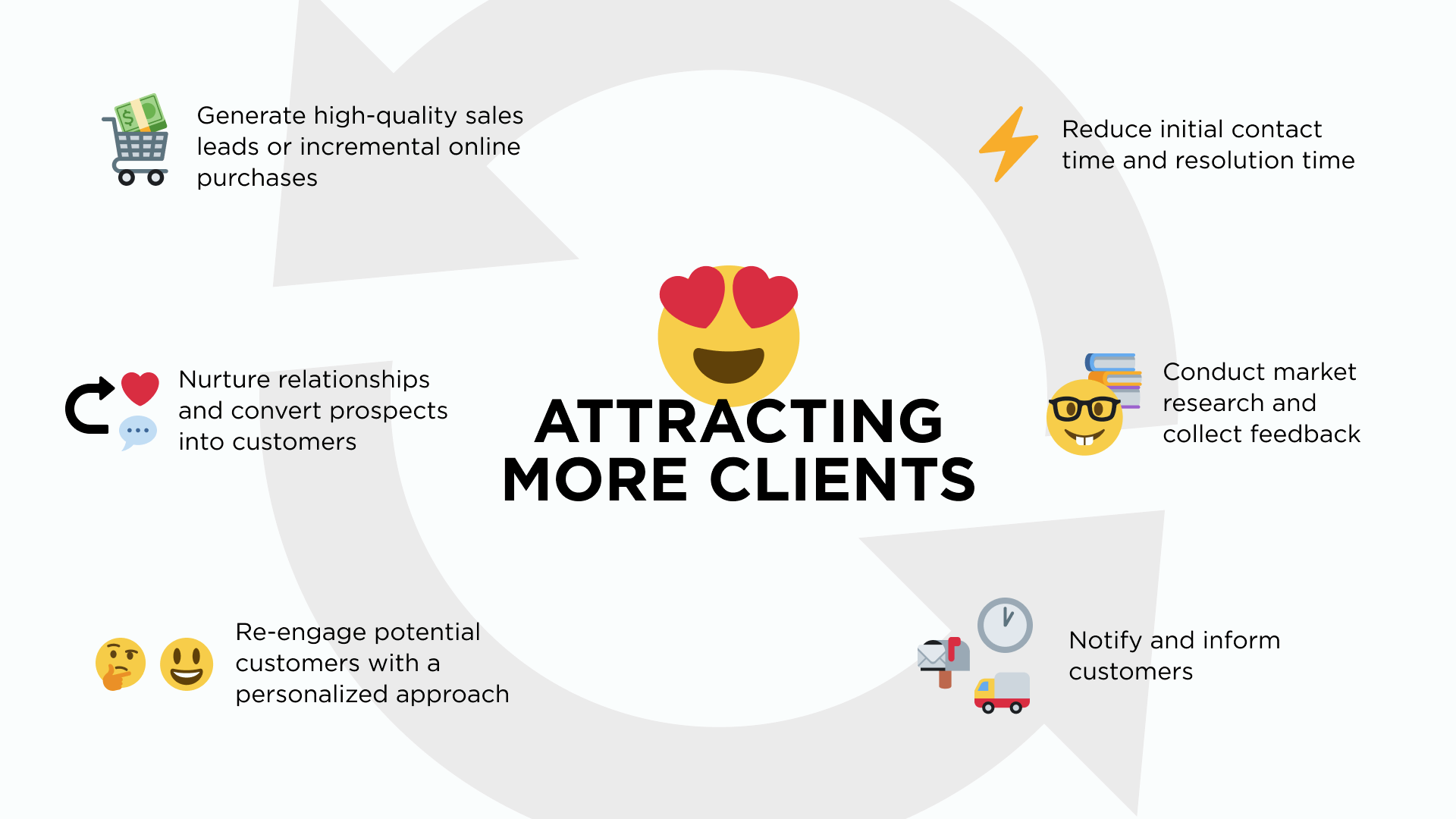
Additional messenger marketing goals include:
- Generating high-quality sales leads or incremental online purchases
- Nurturing relationships and converting prospects into customers
- Re-engaging potential customers with a personalized approach
- Reducing initial contact and resolution times
- Conducting market research and collecting feedback
- Notifying and informing customers (order or delivery status, operating hour updates, etc.)
Generally, messenger marketing is aimed at decreasing customer acquisition costs and enhancing lifetime value via personalized, flexible conversations.
Why does messenger marketing matter for your business?
When business messengers are utilized properly, messenger marketing can feed valuable incremental leads to your sales team.
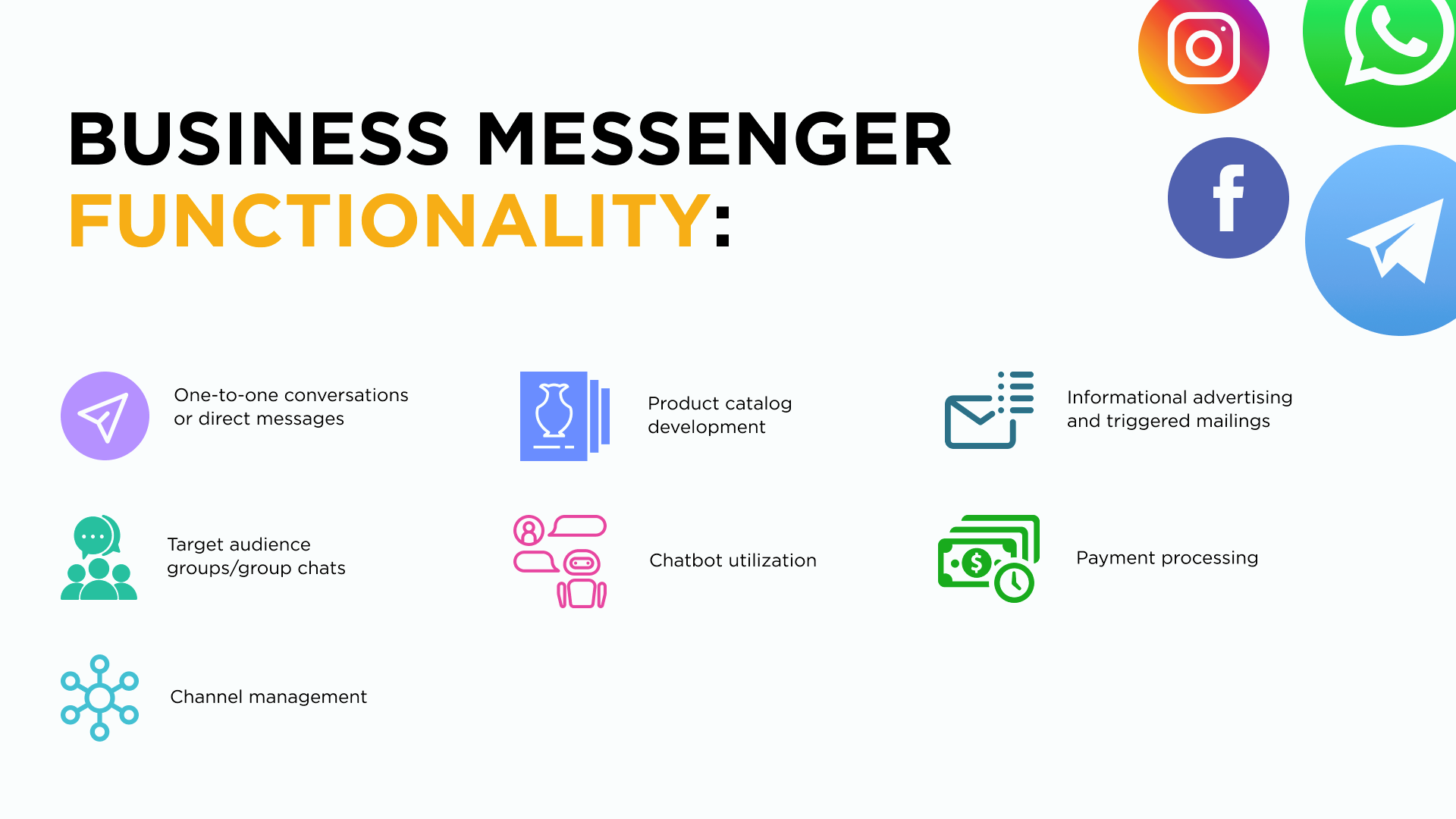
Popular instant messengers allow marketers to leverage the following functionalities to meet their business goals:
- One-to-one conversations or direct messages
- Target audience groups/group chats
- Channel management
- Product catalog development
- Chatbot utilization
- Payment processing
- Informational advertising and triggered mailings
Messenger marketing will soon become an essential part of the process employed to explore, create, and deliver value to customers. The majority of Internet users chat, read news, watch videos, and communicate with companies using instant messengers, with the following statistics providing evidence of channel popularity:
Messenger marketing statistics:
Per Statista, the total instant messenger audience exceeded 2.6 billion users this year. Globally, the most popular messengers are WhatsApp, WeChat, Facebook Messenger, and Telegram.
According to Umnico, in 2021, eastern European companies processed more than 50 billion messages per month. Moreover, it is expected that text-based communications among consumers and businesses will outperform calls in the next three years.
Thus far in 2022, the most popular channels eastern European companies have leveraged to communicate with clients are WhatsApp, Instagram, and Telegram.
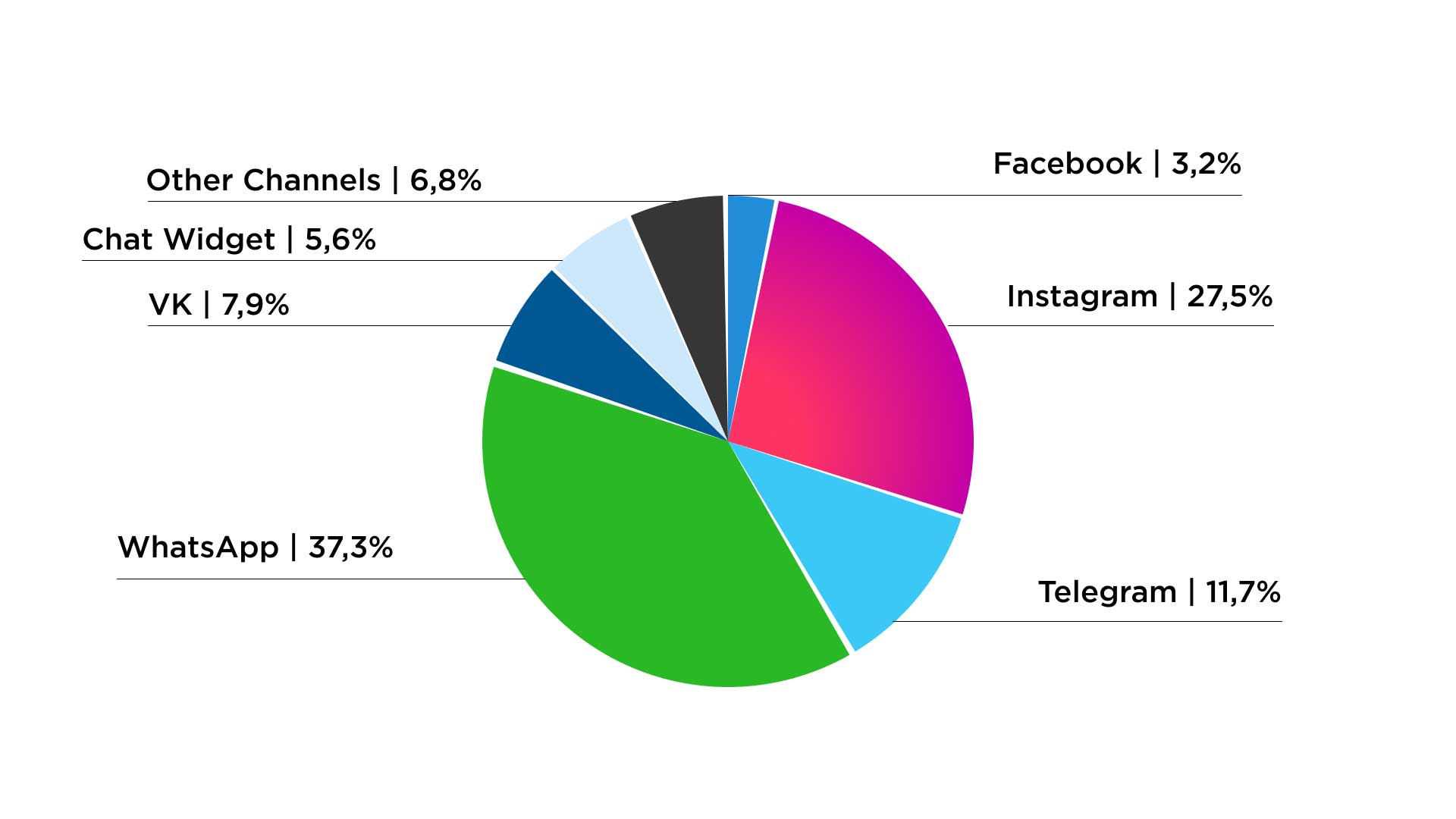
Messenger marketing strategies can create meaningful relationships between businesses and clients, pushing them deeper into the pipeline and eventually closing the deal. However, it is not enough for companies to merely create accounts on WhatsApp and Facebook and then process incoming inquiries in the effort to succeed. Rather, stakeholders must utilize messengers in a competent fashion: creating promotional strategies and communication guidance for social media and integrating these into overarching marketing strategies.
Now, let's examine how messenger marketing differs from other marketing channels.
Messenger marketing vs. other marketing channels
Businesses of all persuasions should consider adding messengers to their existing mix of communication channels—including emails, calls, and social media—to facilitate marketing efforts.
Messenger marketing makes it easier to build a customer base. For example, consumers are more likely to subscribe to a Telegram channel than provide an email address or phone number.
Messengers have a higher open rate. According to ManyChat and Mailchimp, people are more than three times more likely to read messages than open emails—also visiting sites by clicking on links in messages on a more frequent basis.
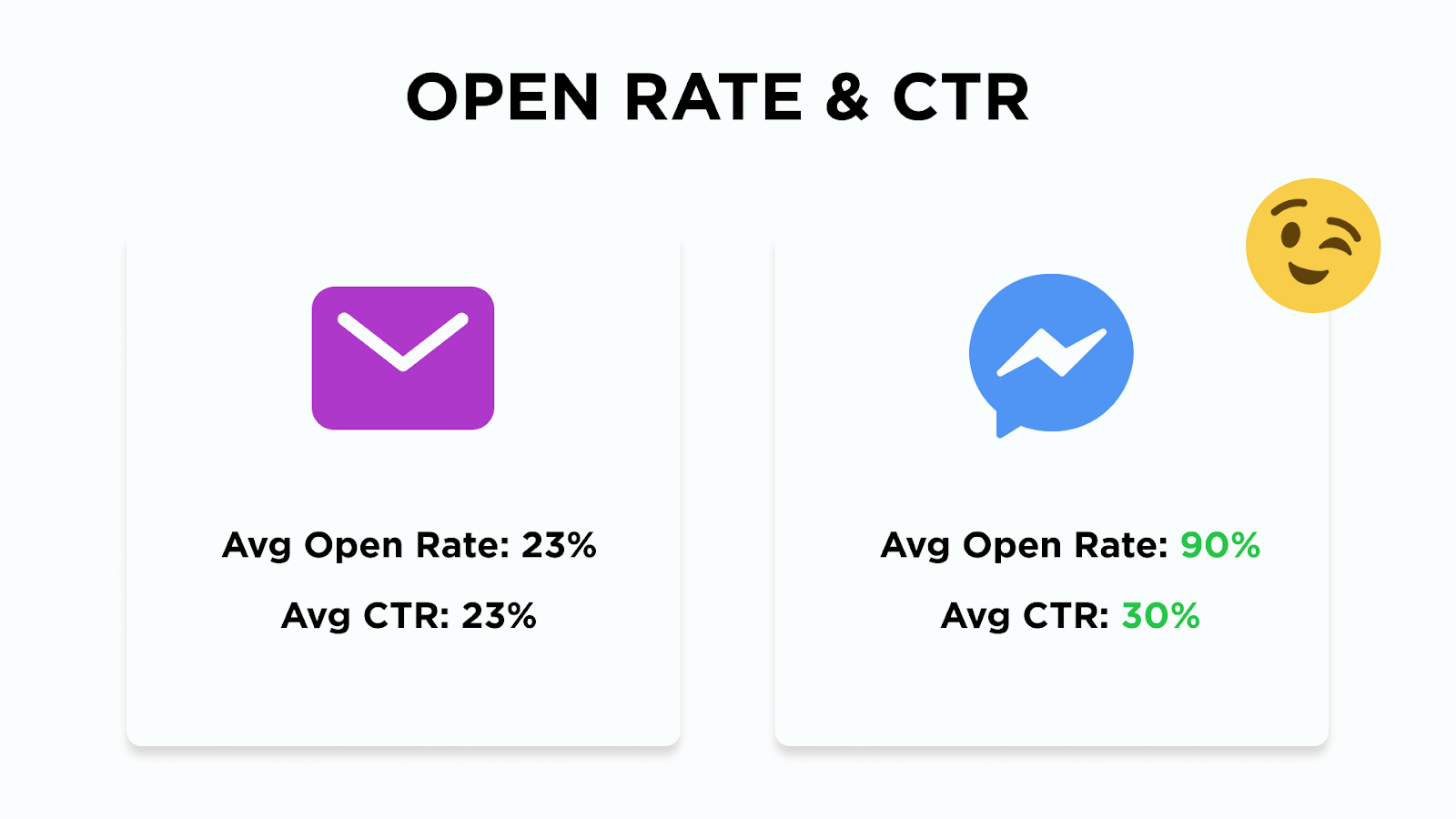
Gather audience insights more quickly. Analyzing user messenger dialogues makes it easy to glean lots of new information and segment any given audience by its interests.
Messengers pave the way for more personalized content marketing. More audience information = better content distribution = quicker purchase conversions.
Active support and feedback are core competencies of instant messengers: providing a convenient way to answer user questions in a convenient way—thereby boosting loyalty—and using chatbots to process frequently asked questions and in turn reduce pressure on customer support.
The ability to automate messenger marketing workflow means some services that work in tandem with instant messengers help simplify employee work, remove routine tasks, and optimize work processes. This helps companies process additional leads and claims while maintaining high-quality work in the absence of extra staff and costs increases.
You can effectively warm up your customer base before making direct sales through messengers, in turn reducing churn rates and improving transaction rates. The same cannot be said for cold calls and annoying emails.
Now, let's discover how to execute messenger marketing tactics.
How does messenger marketing work?
Messenger marketing originates from a customer’s chat window in his or her messaging app. Therein, internet marketers engage users via platforms such as Facebook Messenger or WhatsApp by sharing meaningful and relevant messages: such as texts, images, videos, GIFs, or other documents. A live chat widget can also be used to communicate with visitors to any given website.
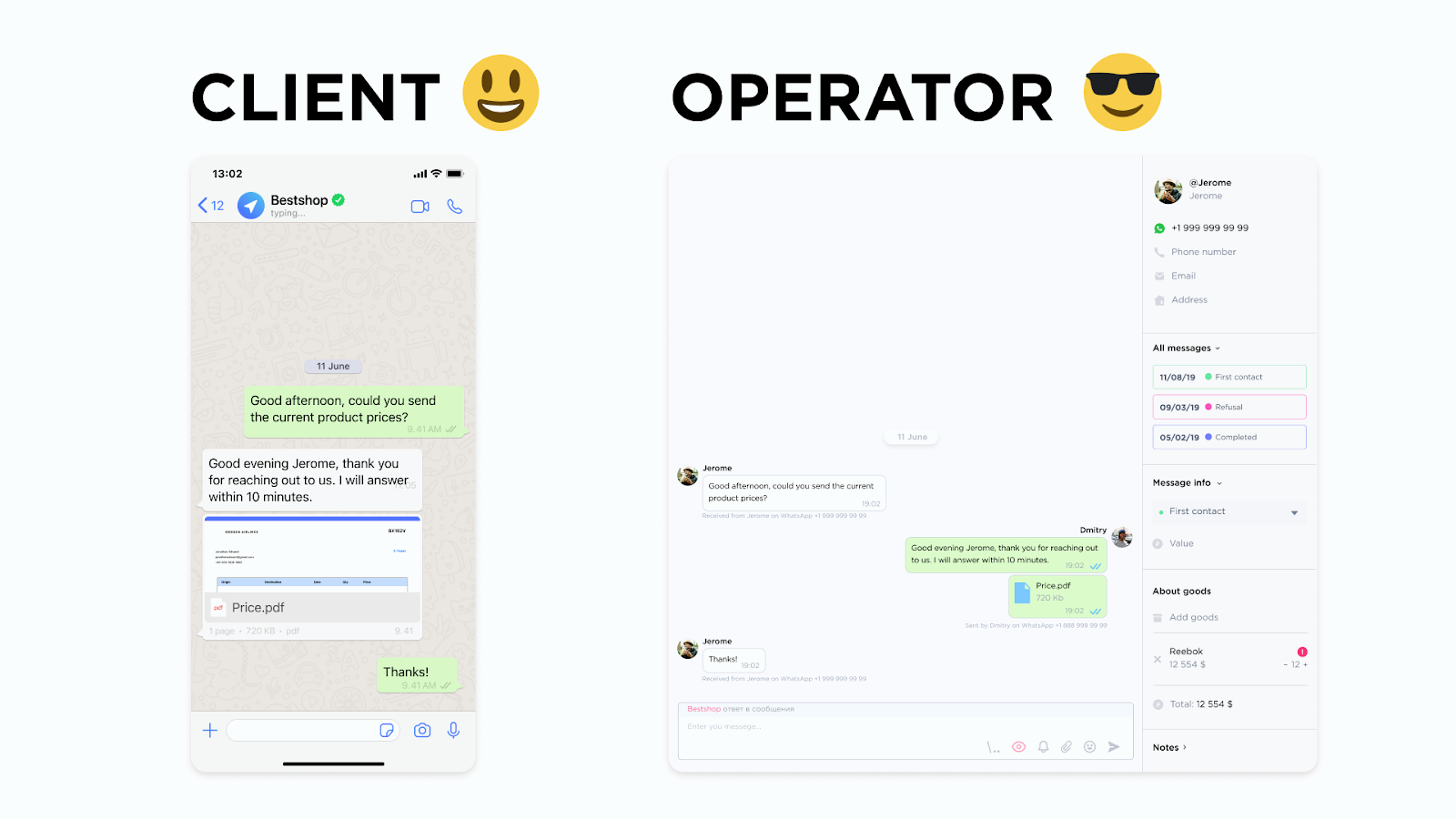
A variety of marketplace services and solutions allow marketers to create new communication channels to engage with an audience.
Here are some popular messenger marketing tools:
- Live chat widget: a small box installed in the corner of a website that makes it easier to chat with a business online
- Chatbot: a computer program that simulates and processes human conversation to process typical inquiries
- Cloud communication platform: a cloud-based service that adds real-time communication capabilities to business applications
- Omnichannel messaging tool: a business solution that delivers seamless, continuing conversations across all instant messengers
- Customer relationship management (CRM) system: technology used to manage all relationships and interactions with customers or potential buyers
- Helpdesk service: software that organizes incident and request management to help businesses respond to customers more quickly and effectively
Some of these tools are free or offer a free trial period to test new communication channels, such as live chats on a website. For example, the omnichannel communication platform Umnico allows businesses to start engaging with clients via over 25 instant messengers and social media through a single interface so that marketers can evaluate a complete list of messenger marketing benefits, free of charge.
To reiterate, messenger marketing offers a capable communication method through instant messengers—allowing businesses to do more than just chat with their customers. Now, let's discover how to measure the success of messenger marketing strategies.
Messenger marketing KPIs
The following indicators help businesses monitor the effectiveness of messenger marketing efforts.
- Number of inquiries/leads: total and per each channel
- Operator response speed
- Time from the first interaction to the sale
- CTR: how often message links are clicked
- Average order value via messengers
- Number of purchases via messengers: total and per each channel
Next, let's review the most popular messenger marketing channels.
Important messenger marketing channels
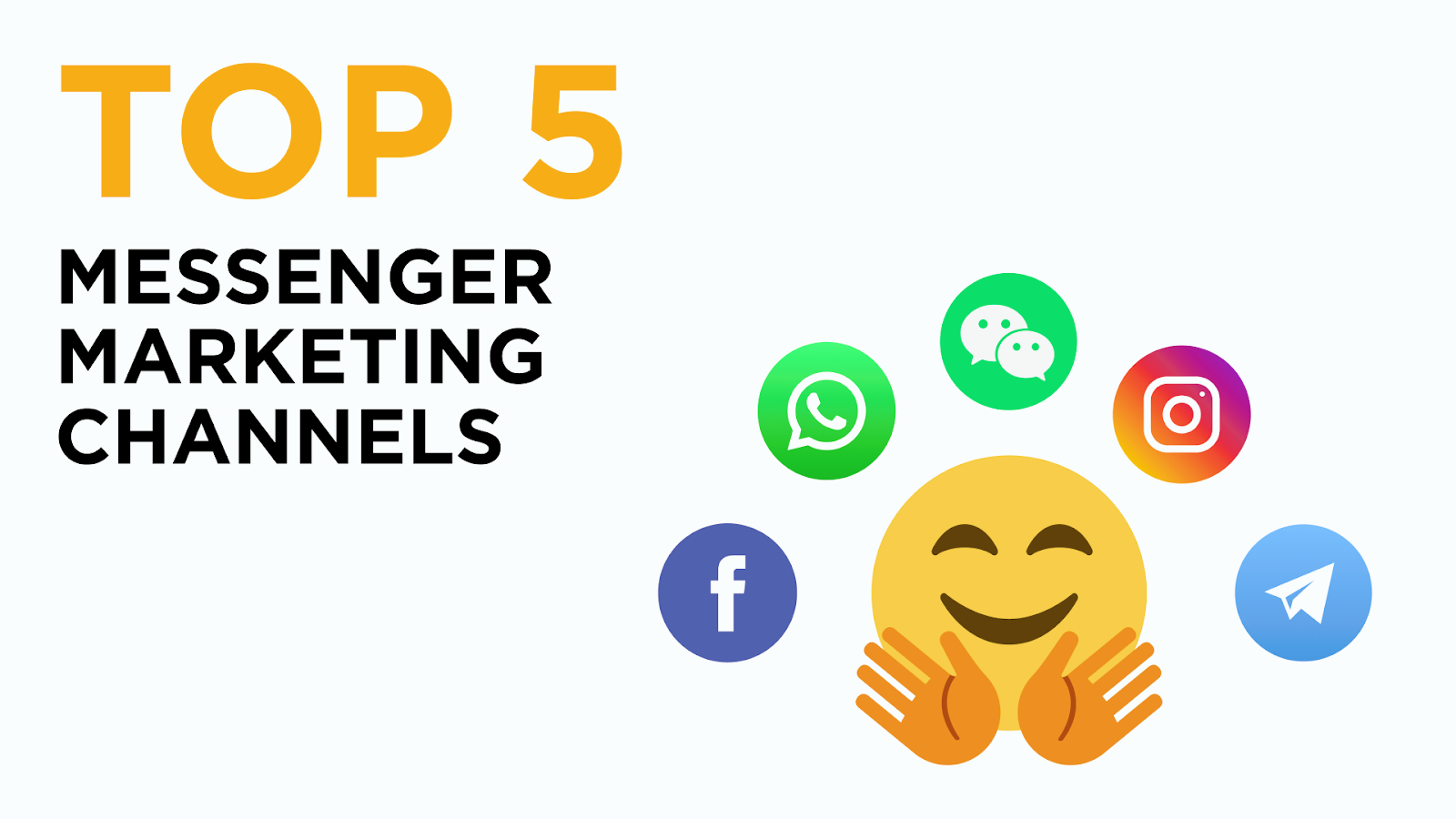
Facebook Messenger. Facebook Messenger is the most popular messaging application in use today. Over 1.3 billion users are already on Facebook, and you can utilize Facebook Messenger to deliver content or support your followers in finding the most relevant consumers, grabbing people’s attention, and generating high-quality sales leads. You can also engage participants during a specific event via Facebook Messenger and re-engage potential customers. Finally, you can provide timely customer support via this channel. As discussed, it’s clear that consumers prefer to contact brands through messaging than other channels; Facebook Messenger provides an excellent way to kick off your messenger marketing journey. Feel free to enable this in your Facebook page settings right now, knowing you can also use Umnico Inbox to combine Facebook with other channels and process all incoming messengers in one window.
WhatsApp. WhatsApp offers several options for businesses that vary per their size and needs.
WhatsApp Business is ideal for small businesses that receive fewer incoming messages and/or use social networks or one-page sites/landing pages to market their products.
Traditional WhatsApp and WhatsApp Business boast several important distinctions, with the latter version:
- Affording companies a profile with details such as a website and contacts
- Providing the ability to track the status of messages (sent, delivered, read)
- Offering templates that pave the way for quicker message replies
Just like its traditional counterpart, the business messenger is a free app tied to the owner's phone number.
WABA (WhatsApp Business API) is a professional solution for enterprise users with a large flow of incoming and outgoing messages (service notifications, marketing mailings, etc.).
WABA also offers the following advanced functionalities:
- More company profile details: website, contacts, business hours, address, mission
- Enhanced statistics
- Chatbot installation
WhatsApp Business API is a paid professional solution.
Instagram Direct is a private instant messaging service used on popular mobile photo-sharing social media sites. It allows Instagram users to chat privately, either one-on-one or in groups, and engaging this group can help your business strengthen relationships with both new and existing customers.
Telegram. Companies can take advantage of personal Telegram account capabilities, create a Telegram Bot, and/or manage a Telegram channel to distribute content. Your sales or support team can also use personal accounts. Moreover, Telegram Bot can help reduce pressure on contact centers by automatically answering typical questions from clients.
Viber offers a wide range of messaging options, including text-based chats, multimedia sharing (photos, videos, and files), emoji and sticker collections, as well as the ability to send voice messages and share locations. Although it is not the most popular communication channel between business and consumers, this messenger has a strong presence in Europe, claiming the top spot in four countries, including Belarus, Bulgaria, Greece, and Serbia. Viber hosts public chat channels on various topics, including entertainment, lifestyle, news, and more, where users can follow, interact, and engage with popular influencers, brands, and communities.
Now, let's discover primary users of these popular messenger marketing channels.
Who is messenger marketing for?
An efficient messenger marketing approach offers businesses from multiple verticals a better way to optimize hundreds of chats from various channels simultaneously, providing the ability to scale social media marketing efforts, process more inquiries, generate leads, and win new accounts.
Modern omnichannel marketing platforms, such as Umnico, also track and store customer information: providing salespeople with the ability to access and utilize this data at relevant moments to pitch to any audience in an ultra-efficient manner.
Messenger marketing sometimes requires the following specialists:
- Direct marketer: a specialist who works with audiences and segments, automates sales funnels, and creates chatbots (also integrating messengers with CRM systems)
- SMM specialist: accountable for working with instant messenger and social media content
- Sales: work with instant messengers throughout all funnel stages and must understand the benefits and features of instant messengers while closing deals (not only through voice channels but also via text)
- Business owners and team leaders: must evaluate the effectiveness of messengers and know which metrics to consider as well as how to optimize and automate work within these channels
The “theory” portion of this crash course in messenger marketing is now complete. Why don't we check out how messenger marketing can help transform your business?
How to improve messenger marketing performance
Effective messenger marketing tactics should be considered as a sequence of messenger actions that can accomplish a specific marketing mission within a given timeframe.
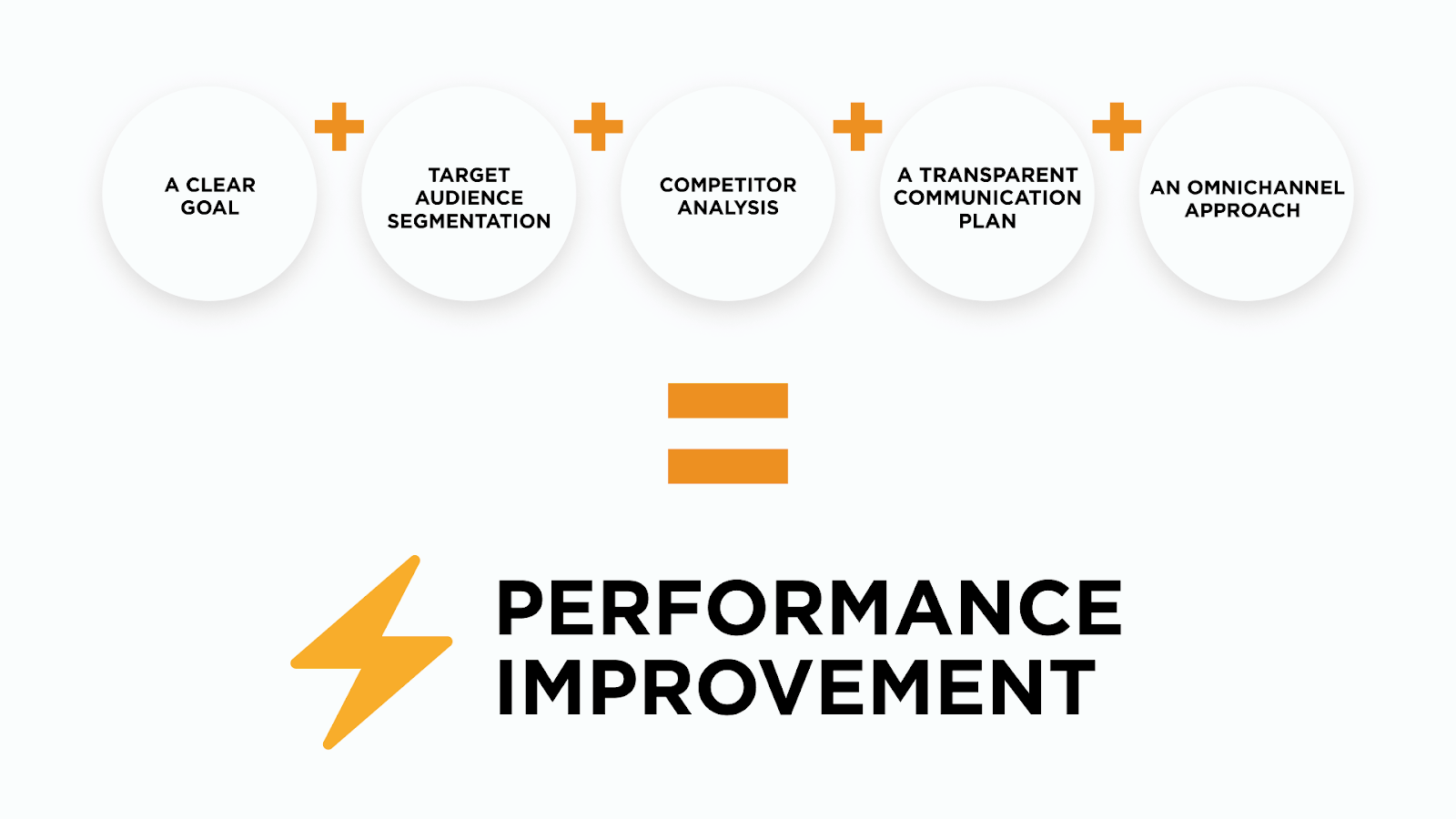
The following strategies help improve messenger marketing effectiveness:
- a clear goal
- target audience segmentation
- competitor analysis
- a transparent communication plan
- an omnichannel approach
First and foremost, companies must clearly state their messenger marketing goals: which should have value for your business, be achievable, have a clear deadline, and offer transparent metrics to report and analyze results.
Next, clearly define and segment the target audience to engage through instant messengers. Dividing the customer list into small segments allows you to improve marketing message personalization, adding relevance to meet specific audience needs.
It is also highly recommended to keep an eye on competitors to identify their strongest and weakest tactics. This may save you from mistakes and improve messenger marketing KPIs. For example, content most interesting and relevant to an audience has a high open-rate and generates more leads.
Script development is another key point, regulating both the sequence of outgoing messages via instant messengers and the algorithms for processing incoming messages from prospects.
Instant messengers should be used for trigger-based mailings as well, and messenger marketing has proven to work most efficiently when businesses follow up with consumers at the right time. For example, a user who abandons shopping cart products on your website can be re-engaged with a reminder or—even better—a small discount as an additional incentive to complete the purchase.
Another proven and highly effective messenger marketing approach is to simultaneously utilize a combination of instant messengers and social media most popular among your target audience. Omnichannel provides a foundation for this tactic, ensuring seamless and effortless high-quality customer experiences that occur within and between multiple contact channels.
Messenger marketing examples
To illustrate the effectiveness of messenger marketing, let’s review the practice of Wella within the Asian market. This well-known brand uses a combination of WhatsApp and Instagram to influence its audience through a chain of segmented mailings based on active conversations—while also processing incoming customer messages via popular messaging platforms. This approach allows Wella to increase sales through messengers and customer retention rates.
Meanwhile, Anex Tour—a leading player in the European tourism industry—has successfully implemented messenger marketing through WhatsApp. A clear algorithm used to process and distribute requests in addition to well-tailored response scripts supports the brand’s ability to resolve problematic situations involving customers who vacation worldwide.
Broadcast Messages and Promotions is the most common example of proactive messenger marketing strategy. Businesses such as HubSpot and DocWays send out broadcast messages on messenger platforms, delivering valuable content, updates, and promotional offers directly to subscribers. Glovo and other e-commerce companies might use broadcast messaging to announce flash sales, new product launches, or limited-time promotions to their customer base.
Messenger marketing is used to guide potential customers through the sales funnel, nurturing leads, providing educational content, and encouraging conversions over messaging platforms. SaaS companies can use messenger marketing to educate potential customers about their product features, offer trials, and ultimately guide them toward a subscription. Moreover, marketers leverage messenger platforms to distribute valuable content, industry news, and newsletter subscriptions, allowing users to stay informed and engaged directly within the messaging app. Publishers and media outlets might offer daily news updates, personalized content recommendations, and curated newsletter subscriptions through messaging apps.
Some businesses use messaging apps to facilitate appointment scheduling, send reminders, and provide updates related to appointments, reservations, or service bookings. Healthcare providers and salons leverage messenger marketing for appointment bookings, sending confirmations, and offering pre-appointment information. Organizations utilize messenger marketing to send event invitations, manage RSVPs, and provide event-related updates, leveraging messaging apps to facilitate event planning and communication. Meetup - social media platform for hosting and organizing in-person and virtual activities, and other event organizers might use messaging platforms to send event reminders, collect RSVPs, and deliver event location details directly to attendees.
Now, it’s time to reveal some effective messenger marketing tactics together with best practices.
Effective messenger marketing tactics
Primary messenger marketing tactics that help marketers include leveraging the sales funnel, mailings, group chats, and lead generation opportunities.
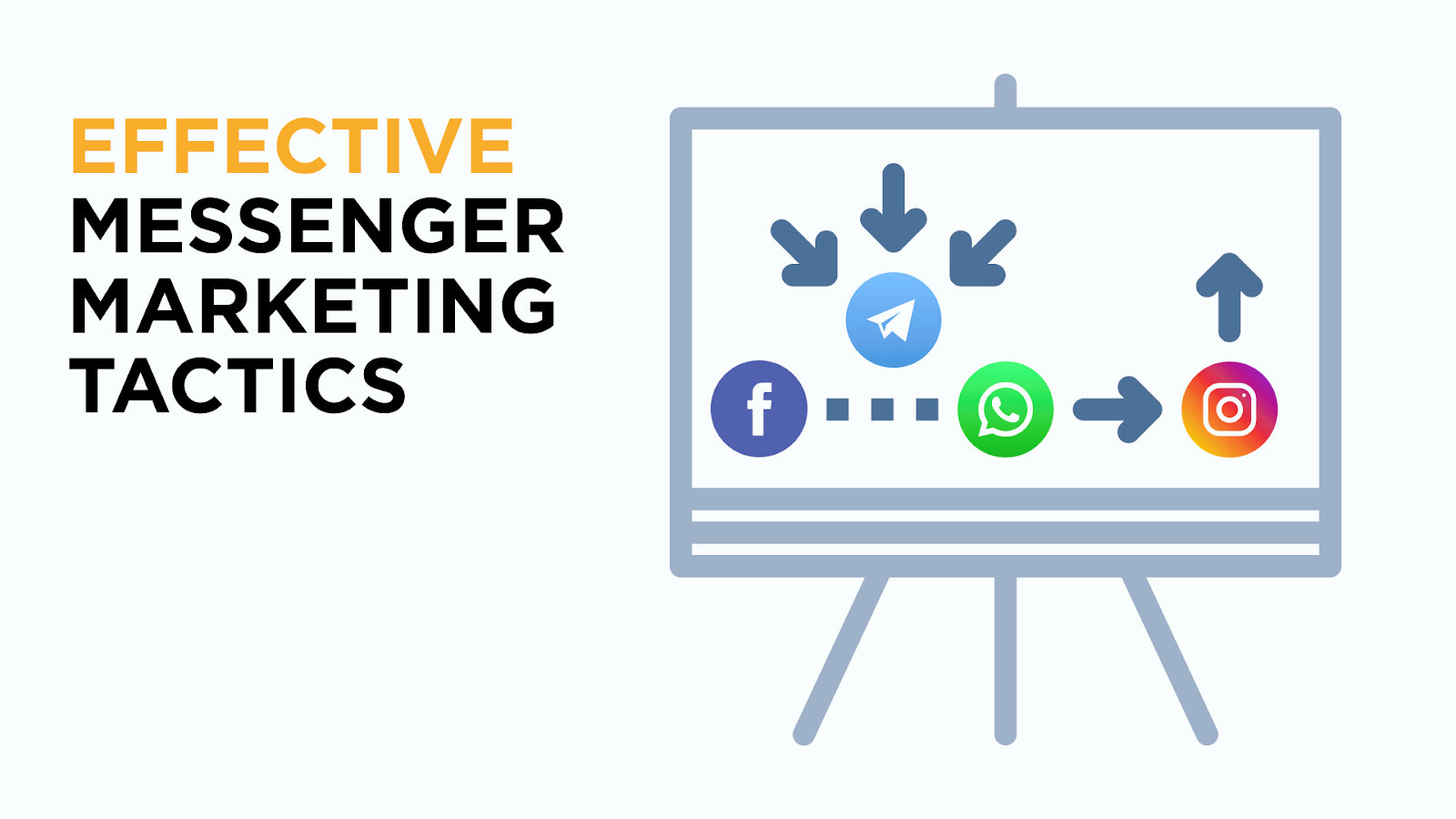
Utilize messenger sales funnels
This marketing concept maps out the customer journey from the first product encounter to an actual purchase and beyond. Messengers allow you to interact with clients at all decision-making stages as a modern digital pipeline spanning four stages: awareness, consideration, decision, and loyalty.
Set up chatbots to automate your workflow
Messenger bots are automated interlocutors that communicate with clients using prepared answers—also separating users into different silos depending on their requests. Chatbots are the most common type of bot, interacting with an individual through buttons, digital commands, or specific words. There are also voice bots that can recognize speech, but their operation principles remain the same: a specific request sparks a specific response.
Take advantage of messenger mailings
Mailings—a well-known strategy that successfully replaces expensive SMS and low-conversion email campaigns—allow you to send text, images, and links with information about promotions, new products, etc. However, always use caution when executing messenger mailings to avoid user complaints or (worse) messenger platform bans.
Manage group chats and communities
Communities and group chats provide a good way to post content about products, news, promotions, discounts, special offers, reviews, or testimonials: also allowing users to exchange opinions about the product or brand and ask company employees questions.
Generate leads through messengers
Utilize messengers to acquire new customers, as current customers can invite their friends and acquaintances to join the company Telegram channel (for example). Moreover, potential customers can contact businesses with questions through the company's WhatsApp. Competent content and subscriber nurturing in messengers can not only boost lead volume but profits as well.
To employ most of the aforementioned messenger marketing tactics, you should consider employing the best messenger marketing platform to tangibly boost your sales and improve retention rates. Learn more about business messengers in practice, sign up for a free Umnico trial, and start building your messenger marketing campaigns right away.
Messenger marketing tips and best practices
Here are some tips and best practices to maximize this trendy marketing approach:
- Use multimedia to demonstrate your products or services rather than write about them
- Avoid unnecessary cold messaging, sending notifications to your existing customer list to increase engagement rates
- Display all communication methods to inform your target audience about all channels employed by your brand (customers need to know how to contact you!)
- Personalize brand-to-consumer communication as much as possible
- Simplify your chatbots, and don't overload bots with too many options. Keep in mind that you need to make the customer journey as smooth and simple as possible
- Engage customers at the beginning of their journey by converting website visitors into messaging contacts via live chat
- Add a "Buy Now” button and links to conversations to start selling in messengers
- Receive customer feedback to update content, scripts, chatbot structure, and more
How to establish messenger marketing
The right tools can make the messenger marketing onboarding process simple and smooth. With this in mind, employ the omnichannel messaging platform Umnico Inbox to start working with business messengers in a pain-free manner. This service processes messages from a variety of channels all in one window, meaning that users need not waste time and miss important inquiries by toggling between different messengers. Umnico supports more than 25 channels and does not require developers to connect them.
Umnico will allow you to:
- Contact clients first on WhatsApp and Telegram
- Set and delegate tasks, assigning specialists
- Speed-up response time with templates and hotkeys
- Use a custom sales funnel to process leads
- Leave notes and assign statuses to dialogues
- Benefit from custom notifications
- Monitor the time, efficiency, and quality of responses
- Analyze requests, conversions, sales, and much more
You can increase messenger marketing effectiveness by combining communication channels with a CRM system. Thankfully, Umnico offers pre-built integrations with popular CRMs and an open messaging API to work with multiple messengers and social media using a simple code. Thus, the company provides a complete list of features required for effective messenger marketing to boost your sales and improve customer support.
The future of messenger marketing
To sum up, personalization and increased customer loyalty will shine through as key marketing trends in the coming years—meaning that businesses delivering the most positive customer experiences will beat out the competition in a highly commoditized market. Messenger marketing provides users with an ideal opportunity to contact companies in a convenient way. Moreover, it helps businesses personalize communication, automate workflows, and engage traffic at no extra cost.
This text-based communication is truly our new reality, so companies can choose to resist or adopt these strategies to facilitate their marketing efforts. It’s for this reason that I have already employed messenger marketing and omnichannel communication platform Umnico to interact with my leads and prospects in an efficient manner. Feel free to join me as the first wave of businesses set to engage a new generation of consumers with this modern marketing approach.
You might be interested in similar topics
What is Conversational Marketing (Its Strategy, Benefits, and Examples)?
Emotional marketing and how to employ it properly
Real-Time Marketing: How to Use it Effectively

Subscribe to Umnico news!
Be the first to get recommendations and up-to-date information
